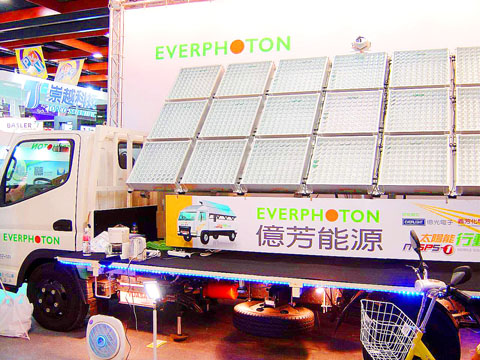The 2008 Taiwan International Photovoltaic Forum and Exhibition, aimed at promoting the solar industry, opened in Taipei yesterday.
This year’s exhibition is bigger than ever, with 155 exhibitors and 299 booths — up 109 percent and 172 percent respectively from last year — the Taiwan External Trade Development Council (TAITRA) said.
In his opening remarks yesterday, Deputy Minister of Economic Affairs Shih Yen-shiang (施顏祥) said that solar energy was a hot market, with statistics showing that the industry has been growing at a compound annual growth rate of 35 percent since 1998.

PHOTO: CHEN YUNG-CHI, TAIPEI TIMES
“Taiwan’s solar industry is well established, except for polysilicon at the very top of the stream ... Based on our successful experiences developing the semiconductor and thin-film-transistor liquid-crystal-display (TFT-LCD) industries, I believe Taiwan will become the most important solar manufacturing base in the world,” Shih said.
The total production value of Taiwan’s photovoltaic industry reached NT$53.5 billion (US$1.65 billion) last year and is projected to exceed NT$100 billion this year, Shih said, adding that the value should exceed NT$400 billion by 2015.
Taiwan has become the fourth-largest solar cell manufacturing country in the world, with a solar cell output of 545 megawatts-peak (MWp) last year, accounting for almost 13 percent of global production.
Taiwan Photovoltaic Industry Association chairman Lan Chung-wen (藍崇文) said that grid parity, the point at which photovoltaic electricity is the same price as grid electricity, might be achieved in 2012 or 2015, adding that this would boost industry growth.
In addition, Lan said the industry stood to benefit from the fact that one-fourth of the world’s population does not have access to electrical grids. It is estimated that the use of solar energy will grow sharply in less developed countries after 2012, Lan said, citing a European Photovoltaic Industry Association report.
The leading international companies participating in the two-day expo include Q-Cells AG, the world’s second-largest manufacturer of solar cells, based in Germany, E. I. du Pont de Nemours and Co from the US, and Nisshinbo Industries Inc from Japan.
Leading Taiwanese companies participating in the fair include E-Ton Solar Tech Co (益通光能), Gintech Energy Corp (昱晶能源) Green Energy Technology Inc (GET, 綠能科技) and many others.

SEMICONDUCTORS: The German laser and plasma generator company will expand its local services as its specialized offerings support Taiwan’s semiconductor industries Trumpf SE + Co KG, a global leader in supplying laser technology and plasma generators used in chip production, is expanding its investments in Taiwan in an effort to deeply integrate into the global semiconductor supply chain in the pursuit of growth. The company, headquartered in Ditzingen, Germany, has invested significantly in a newly inaugurated regional technical center for plasma generators in Taoyuan, its latest expansion in Taiwan after being engaged in various industries for more than 25 years. The center, the first of its kind Trumpf built outside Germany, aims to serve customers from Taiwan, Japan, Southeast Asia and South Korea,

Gasoline and diesel prices at domestic fuel stations are to fall NT$0.2 per liter this week, down for a second consecutive week, CPC Corp, Taiwan (台灣中油) and Formosa Petrochemical Corp (台塑石化) announced yesterday. Effective today, gasoline prices at CPC and Formosa stations are to drop to NT$26.4, NT$27.9 and NT$29.9 per liter for 92, 95 and 98-octane unleaded gasoline respectively, the companies said in separate statements. The price of premium diesel is to fall to NT$24.8 per liter at CPC stations and NT$24.6 at Formosa pumps, they said. The price adjustments came even as international crude oil prices rose last week, as traders

Taiwan Semiconductor Manufacturing Co (TSMC, 台積電), which supplies advanced chips to Nvidia Corp and Apple Inc, yesterday reported NT$1.046 trillion (US$33.1 billion) in revenue for last quarter, driven by constantly strong demand for artificial intelligence (AI) chips, falling in the upper end of its forecast. Based on TSMC’s financial guidance, revenue would expand about 22 percent sequentially to the range from US$32.2 billion to US$33.4 billion during the final quarter of 2024, it told investors in October last year. Last year in total, revenue jumped 31.61 percent to NT$3.81 trillion, compared with NT$2.89 trillion generated in the year before, according to

PRECEDENTED TIMES: In news that surely does not shock, AI and tech exports drove a banner for exports last year as Taiwan’s economic growth experienced a flood tide Taiwan’s exports delivered a blockbuster finish to last year with last month’s shipments rising at the second-highest pace on record as demand for artificial intelligence (AI) hardware and advanced computing remained strong, the Ministry of Finance said yesterday. Exports surged 43.4 percent from a year earlier to US$62.48 billion last month, extending growth to 26 consecutive months. Imports climbed 14.9 percent to US$43.04 billion, the second-highest monthly level historically, resulting in a trade surplus of US$19.43 billion — more than double that of the year before. Department of Statistics Director-General Beatrice Tsai (蔡美娜) described the performance as “surprisingly outstanding,” forecasting export growth